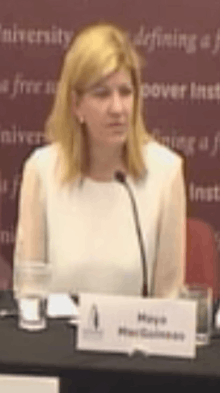Maya MacGuineas
| Maya Carol MacGuineas | |
|---|---|
 Maya MacGuineas on Hoover Institution panel on carbon tax, Marc 29, 2017 | |
| Born |
February 21, 1968 Washington, D.C., USA |
| Education | B.A. Northwestern University, M.P.P. Harvard University[1] |
| Occupation | Policy Policy Organization President |
| Spouse(s) | Robin Jermyn Brooks [2] |
| Children | William (2004), Annika (2006)[3] |
| Website | http://crfb.org/staff-members |
Maya MacGuineas (born in February 21, 1968 in Washington, DC) is the President of the Committee for a Responsible Federal Budget, a bipartisan, non-profit organization in the United States committed to educating the public about issues that have significant fiscal policy impact. A native Washingtonian, she obtained a Master in Public Policy from the John F. Kennedy School of Government at Harvard.
Background
Education
Born in Washington in 1968 to D. Biard MacGuineas and Carol Kalish.[2] She graduated from Northwestern University, where she majored in economics and psychology, and she received a master's degree in Public Policy from the John F. Kennedy School of Government at Harvard University.[3]
Professional career
MacGuineas has run the Committee for a Responsible Federal Budget since 2003, and works mainly on issues related to fiscal, tax, economic, and retirement policy. Senator Mark Warner called her "a trusted intermediary"[4] as she has worked with Democratic and Republican lawmakers.[5] She has also been called "an obsessively nonpartisan, data-driven, well-connected champion of...fiscal responsibility."[6]
She has also published a number of articles, including in The Atlantic Monthly, The Washington Post, The New York Times, the Financial Times and the Los Angeles Times. Once dubbed "an anti-deficit warrior" by The Wall Street Journal[7] and "queen of the deficit scolds" by economist Paul Krugman,[8] MacGuineas has appeared on broadcast news and is often cited by the national press. She also is a regular contributor to the Wall Street Journal 'Think Tank' feature.
MacGuineas also served on The Washington Post editorial board in the Spring of 2009, where she covered economic and fiscal policy and wrote extensively on the health care reform debate.
She was the Director of the Fiscal Policy Program at the New America Foundation—a nonpartisan think tank based in Washington, DC.[9]
Before joining the New America Foundation,[10] MacGuineas worked at the Brookings Institution, the Concord Coalition, and on Wall Street. She has also advised numerous candidates for office from both parties, and works regularly with members of United States Congress on health, economic, tax, and budget policy.
MacGuineas served as a member of the Debt Reduction Task Force[11] at the Bipartisan Policy Center.
Publications
- Trump's Skinny Budget Gets An Incomplete
- President Trump Needs to Address the National Debt Now
- Full Obamacare Repeal Has High Cost
- The First Step Towards Solving the Debt Crisis: Stop Digging
- Neither Candidate Has Any Real Plan for Our National Debt
- In Latest CBO Data, More Warnings that Debt is on An Unsustainable Path
- Our Debt Problem Needs Action-Not Empty Promises
- Repairing the Budget Process
- We Can't Borrow Our Way to Prosperity
- Closing the Hurricane Gap
- Setting a Fiscal Goal
- Reducing the Budget Deficit Requires More Than Just Health Care Reform
- Benefits of a Balanced Budget
- Homeowner tax breaks are breaking the budget
- Radical Tax Reform
- Health Reform's Savings Myth 31 May 2009
- Capping Individual Tax Expenditures
- The Future Is Now: A Plan to Stabilize Public Debt and Promote Economic Growth
References
- ↑ "Washington Life Magazine - March 2002 - Washington Weddings". Washingtonlife.com. Retrieved 29 March 2011.
- 1 2 "WEDDINGS; Maya MacGuineas, Robin Brooks". The New York Times. 13 January 2002. Retrieved 29 March 2011.
- 1 2 "Budget panel president's 'exhausting' dream job". Washington Times. 13 December 2009. Retrieved 29 March 2011.
- ↑ Brady, Jessica (14 November 2011). "Maya MacGuineas in High Demand During Fiscal Debate". Roll Call. Retrieved 6 January 2017.
- ↑ Lowrey, Annie (23 December 2012). "A Campaign on U.S. Debt Gains Steam". The New York Times. Retrieved 6 January 2017.
- ↑ Khimm, Suzy (20 December 2012). "Maya MacGuineas's CEO-powered Crusade Against the Deficit". The Washington Post. Retrieved 6 January 2017.
- ↑ Izzo, Phil (1 June 2009). "Secondary Sources: Health Care, Reich on GM, Borrowing - Real Time Economics". The Wall Street Journal. Retrieved 29 March 2011.
- ↑ Paul Krugman (22 December 2012), Maya and the Vigilantes The New York Times
- ↑ "Maya MacGuineas". NewAmerica.net. Retrieved 29 March 2011.
- ↑ Morin, Richard; Deane, Claudia (10 December 2001). "Big Thinker. Ted Halstead’s New America Foundation Has It All: Money, Brains and Buzz". The Washington Post, Style section, p. 1.
- ↑ "About Domenici-Rivlin Debt Reduction Task Force - Bipartisan Policy Center". Bipartisan Policy Center.